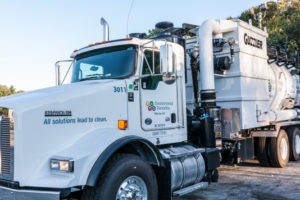
If you manage a restaurant, you’re likely already aware of the importance of maintaining your facility’s grease trap to avoid buildup. And, if you’re well-versed in how grease traps function, you’re probably also aware of just how important it is to stay on top of scheduled cleanings. But what exactly would happen if you completely ignore the suggested three month cleaning time?
Phase One: Grease Begins to Pile Up
It’s time for your scheduled cleaning, but this month you decide to put it off. Whether you’re trying to cut costs or you’re busier than usual, you have come to the critical decision to cancel your upcoming cleaning. I mean, just how bad could it possibly be if you only miss one month?
As the weeks begin to pass by, your grease trap will begin to experience clogging in both incoming and outgoing lines. While you won’t visually notice any grease buildup, your customers will likely start to smell a foul odor coming from your kitchen and bathroom pipes.
Phase Two: The Overflowing Grease Buildup Will Begin to Backflow Into Your Plumbing System
As FOGs continue to back up the incoming pipes of your system, it will leave new grease to buildup with nowhere to go. This will cause newly-flushed grease to sit in your pipes – essentially forcing your entire grease trap system to stop working.
As this process continues, your plumbing system will also be affected. Along with an odor, you will begin to experience a reduced water pressure that will cause water to drain slowly – all of which could no doubt be disastrous to the livelihood and functioning of your facility.
Phase Three: As Unwanted Grease Continues to Overflow, It Will Begin to Seep Into the Local Water System
As more weeks pass by without routine maintenance, your incoming pipes will continue to back up – eventually leaving excess water and grease buildup with no other place to go. By this point, you’ve likely already experienced on-site plumbing issues, but a more dire situation is occurring within the outgoing pipes of your grease trap system. As blockages continue to force their way out of the grease trap entirely, excess FOGs will begin to creep into the city’s local wastewater supply.
This will result in blockages that often cause major leaks within city pipes. At this point, officials will be sent out to remove the clog and repair broken water lines. Here, they will then discover the source of the blockage – excess grease. Because it is illegal to dump grease into the local water system, an investigation will begin with officials working to track down the source of the blockage. Once they make their way back to your business, you will be handed hefty fines for FOG violations.
You can avoid any potential backlash and fines by staying on top of your scheduled grease trap cleaning. While the EPA recommends having your grease trap cleaned at least once every three months, this estimate can vary depending on the size of your grease trap and the volume of grease your facility produces. Not sure how often you should have your system cleaned? Looking to schedule your next routine cleaning? Reach out to us or request a quote and we can help get you on the right track.
